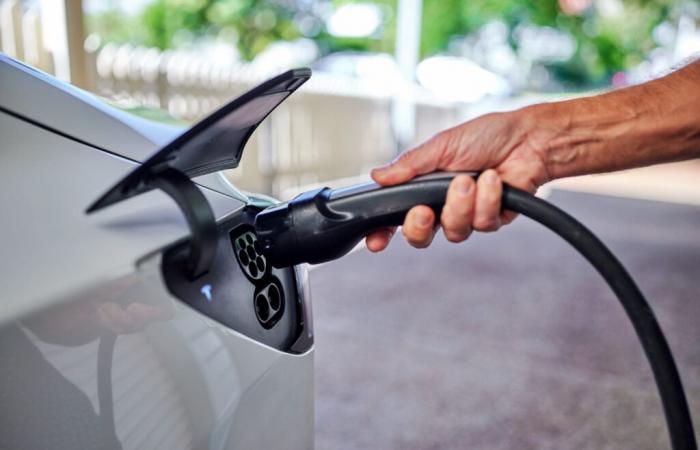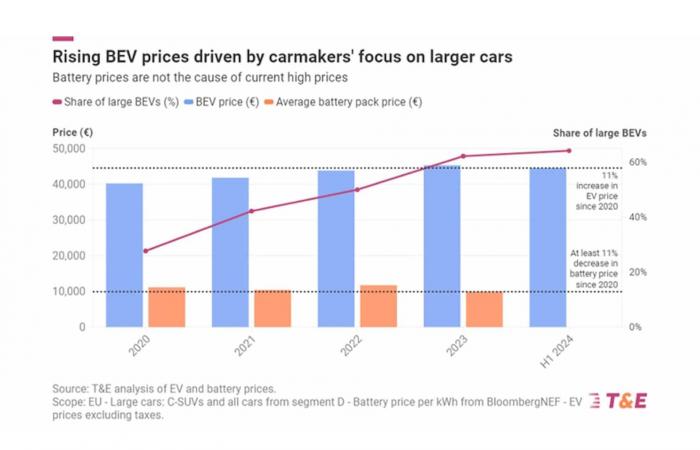Electric car news
You have surely already wondered about the current paradox of the electric automobile market. On the one hand, we hear about the spectacular fall in the price of batteries, a major component of electric vehicles. On the other hand, the entry fee to acquire these cars still seems high, even increasing. Let's dissect together this phenomenon which intrigues both consumers and sector experts.
The reality of the figures: a significant increase in prices
Contrary to what one might think, the average price of electric cars has increased significantly in recent years. A recent study carried out by Transport & Environment reveals an average increase of 11% in Europe between 2020 and 2024. In concrete terms, this means that an electric car that cost around 40,000 euros four years ago is now trading around 45 000 eurosexcluding taxes and depending on the country. This upward trend may seem counterintuitive, especially when we know that the cost of batteries, which represents approximately 40% of the total price of an electric vehiclefell significantly. In fact, the price of a battery kWh has decreased by 33% since 2020reaching an average of $151. So how can we explain this apparent contradiction?

The factors behind this price increase
Several elements come into play to explain this increase in prices, despite the drop in the cost of batteries: 1. The move upmarket of the vehicles offered One of the main factors is the evolution of the market towards larger and more luxurious vehicles. Sales of electric SUVs have doubled in four yearsgoing from 28% market share in 2020 to 64% in 2024 for segments C and D. These vehicles, naturally more expensive than city cars or compacts, push the average price upwards. 2. Manufacturers' pricing strategies Some manufacturers have deliberately increased their prices, taking advantage of the growing demand for electric vehicles. This is particularly the case for premium brands like Mercedes and BMW, which have seen their prices increase by respectively 55% and 50% in four years. Conversely, other brands like Volvo have lowered their prices by 31%, while the Stellantis group shows a slight drop of 4%.
The impact of public policies on prices
Incentive policies for the purchase of electric vehicles also play a crucial role in consumers' price perception. The gradual reduction of purchasing aid in several European countries has contributed to making electric cars less accessible for many households. In France, for example, the ecological bonus has undergone several modifications in recent years, with a downward trend for the most expensive vehicles. This evolution of public aid forces manufacturers to rethink their pricing strategy, which can sometimes result in an increase in list prices to compensate for the reduction in subsidies.
Future prospects: towards a fall in prices?
Despite this upward trend, the future looks bright for consumers interested in electric cars. Several factors suggest a drop in prices in the years to come:
- The arrival of new, more affordable models: manufacturers like Volkswagen, with its future ID.2 and ID.1, or Renault with its new electric Twingo, plan to launch vehicles priced at less than 20 000 euros.
- Continued decline in battery costs: Technological advancements and increased production volumes are expected to continue to drive costs down.
- Increased competition: the arrival of new players on the market, particularly Chinese, could push historic manufacturers to lower their prices.
The importance of consumer education
Faced with these price changes, it is crucial that consumers are well informed to make informed choices. It is important to consider not only the purchase price, but also the total cost of owning an electric vehicle. Savings on maintenance and fuel can offset a higher purchase price in the long run. In addition, taking into account environmental performance is becoming an increasingly important criterion of choice for many motorists. According to the Transport & Environment study, 57% of Europeans say they are in favor of the idea of buying an electric car, despite the obstacles linked to price. As an automotive journalist, I encourage you to consider all of these aspects when thinking about purchasing an electric vehicle. Current prices may seem high, but they reflect a complex market reality, between technological developments, manufacturers' strategies and public policies. With the upcoming arrival of more affordable models and the continued decline in the cost of batteries, the electric car market should become more and more accessible in the years to come.
Written by Philippe Moureau
Forty-year-old passionate about electric cars. I am interested in the energy transition and the fight against greenhouse gas emissions. I am a true electric car enthusiast and environmental advocate.
React to the article








